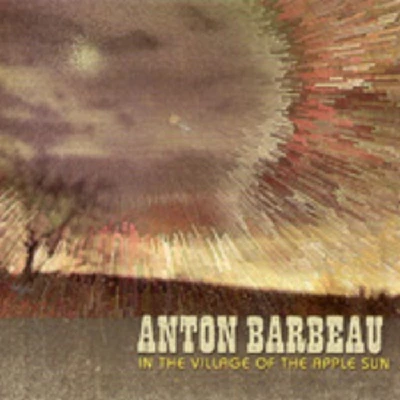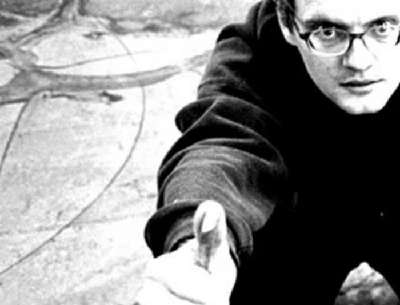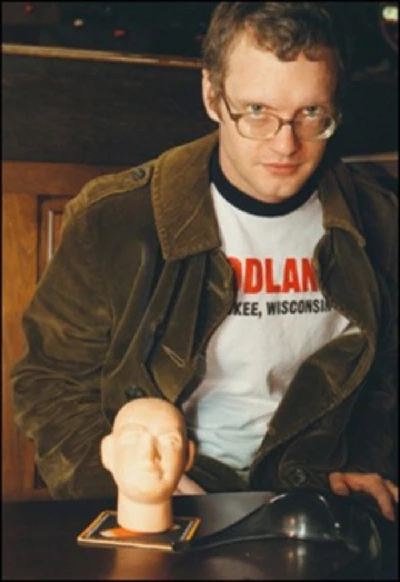Anton Barbeau
-
In the Village of the Apple Sun
published: 20 /
4 /
2008

Andrew Carver examines eccentric Sacramento-based musician Anton Barbeau's psychedelic and uniquely distinctive 2006 album, 'In the Village of the Apple Sun'
Article
Anton Barbeau is one of the myriad cult performers to sprout from the psychedelic family tree. Like Major Stars, the Bevis Frond, Julian Cope and Robyn Hitchcock and the grand pere of psychedelic cult heroes, Syd Barrett, Barbeau has a distinct musical personality: Where Hitchcock’s psychedelic world is populated by insects and strange figures (‘Madonna of the Wasps,’ ‘The Man With The Lighbulb Head’), and Nick Saloman’s reflects a sentimental hippy past, Barbeau’s psychedelic scenery holds a mirror up to a Sacramento occupied by drug takers, offbeat ideologues and slightly seedy 60s holdouts.
You could compare Barbeau to Robyn Hitchcock – I know I have. Both can trace their musical lineage back to Barrett’s work in Pink Floyd and as a solo artist, the Beatles, British psychedelic combos of the Chocolate Soup school like Fire and the Action /Mighty Baby, with Barbeau blending in further U.S. influences like the Chocolate Watchband obscure outfits like Raik’s Progress and a bit of the new wave – XTC and early Julian Cope are often mentioned.
‘In the Village of The Apple Sun’ is one of Barbeau’s more recent efforts, but could have emerged almost anywhere along the line of his musical career, with its melange of daft lyrics, strange guitar noises and Barbeau’s distinct vocal snark kept in line by his knack for a melody you can hum.
Like other Barbeau albums ‘Village of the Apple Sun’ boasts an off-kilter grab bag of production tricks. Some of it sounds like it was recorded in a bedroom on a four track (and probably was), while other portions sound like a full band stepped into a studio. (Then there are the bits that sound like a full band was wedged into his bedroom.)
As you’d expect, there’s plenty of guitar in ‘Village of the Apple Sun.’ But not just any old guitar: Various players get credit for spaced guitar, twittery guitar, chordalfuzz guitar, bell guitar, dawn-eye fade-out guitar, beak guitar and plain old “rock-and-roll guitar.” Then there’s the riffy guitar, bong guitar, magic christian radio guitar and the always psychedelic backward guitar. As long as Barbeau and his kind wander the Earth, the makers of effects pedals need never go hungry. Elsewhere you can hear the jangle of early Byrds, as in ‘On A Bicycle Built for 9’.
The cheesy drum machine and tambourine that keep the beat on ‘Mushroom Box, 1975’ are a good example of Barbeau’s bedroom aesthetic at its most basic; the feathery female vocals are another hallmark of his work.
‘Village’ isn’t entirely a guitarholic’s dream. On several songs Barbeau hands the more sonically adventurous parts to other musicians and sticks to the keyboards, such as the dreamy piano on the somnolent ‘The Eye On My Hand’.
Barbeau’s distinctive vocals are as quirky as ever, but seem particularly well suited to the weirdo lyrics. If you’re going to invite the listener to “rearrange the tables in the lounge car of your brain” – as Barbeau does on ‘Mushroom Box, 1975’ or play the neighbourhood oddball on ‘The Bane of Your Existence of Your Name’ you don’t want to sound like a refugee from the Easy Listening charts. ‘This Is Why They Call Me Guru 7’, also stands out for featuring the album's mental and lunar preoccupation with the line "This is when the moon in your mind comes alive."
Barbeau’s tunes contain a healthy strain of power-pop as well, and the distant echo of the Beatles can be heard in a number of songs. The whimsical ‘Murray Boots Are Conquering the World’ sounds like something that a Midwest garage band might cook up after it’s first listen to ‘Sgt. Pepper’s Lonely Hearts Club Band’, with some violin drone substituting for the unavailable Indian instruments.
‘Seeds of Space’ which goes from hectic to outright bonkers, could be a pastiche of the chorus from the Beatles ‘Taxman’ welded to ‘Across the Universe’.
Another Barbeau hallmark: Half-germinated ideas like ‘Eric Has Gone Wrong” – a chanted chorus of echoing voices without a song to call home – and ‘My Hair is Oily’ for which the entire lyric is “My hair is oily, my hair is dry, and I’m going to live forever til the day I die’.
Barbeau says he’s at work on a new album, dubbed ‘Solitary Bees’, which he he says should appeal to the “freakier” element among his fan, compared to ‘The Automatic Door’ his previous effort which rested more on his strength as a singer/songwriter. Whichever direction he takes, his fans will know it’s him on the first listen.
Track Listing:-
Band Links:-
http://www.antonbarbeau.com/
https://www.facebook.com/Anton-Barbeau
Have a Listen:-
Picture Gallery:-

